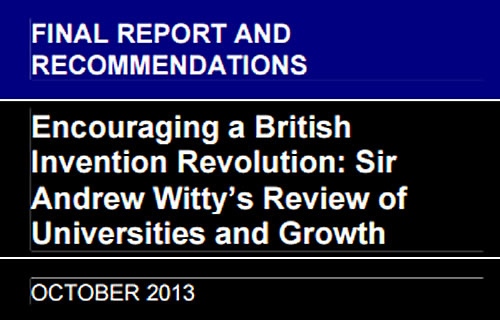Sir Andrew Witty’s Review of Universities and Growth
Encouraging a British Invention Revolution: Sir Andrew Witty’s Review of Universities and Growth
Foreword:
Since my Review was commissioned, I have had the chance to review evidence and meet entrepreneurs, members of LEPs, Business Schools and Universities across the country.
Two conclusions dominate:
- The UK has an extraordinary wealth of ideas, technology and human energy – much of which is world-leading and capable of seeding not just new companies but whole industries with potential to build substantial export positions.
- Significant scope exists to better align funding streams, organisational focus and increase cross institution collaboration to avoid delays in ideas reaching maturity and the risk of British inventions building foreign industries.
At an early interview session, I was deeply struck by the statement: “Britain doesn’t breed entrepreneurs, it breeds endurance entrepreneurs”. The point being that the ‘thicket’ of complexity that exists between central and local structures and diffusion of funding and advisory energies leads to unnecessary hurdles for those striving to translate ideas to job creating businesses.
At the heart of my recommendations – three philosophies:
- Structure funding flows by technology/industry opportunity – not by postcode. We should embrace the country’s density of population and institutions and drive greater collaboration wherever the ‘idea flows’ – eliminating unnecessary regional barriers which create domestic competition instead of marshalling our resources to run a global race.
- Universities have an extraordinary potential to enhance economic growth. The full Encouraging a British Invention Revolution: Sir Andrew Witty’s Review of Universities and Growth diversity of institutions have a role to play from local SME support and supply chain creation to primary technology leadership and breakthrough invention. Incentives should be strengthened to encourage maximum engagement from Universities in the third mission alongside Research and Education.
- Government should help facilitate what I have called Arrow Projects* to drive forward globally competitive technological ideas into real businesses. The Arrows should provide full support to the invention at the ‘Tip’ and should be uninhibited by Institutional status, geography or source of funding. Government should put its weight behind creating global scale through encouragement of real collaboration in fields in which we can win. A great debate has taken place on whether Britain can or should have an ambition to grow its manufacturing sector.
It seems obvious that at least two basic conditions need to be met to have any chance of a long term sustainable manufacturing base:
- An invention culture which successfully translates from ‘mind to factory’.
- A globally competitive sense of timing and scale.
My review has convinced me that while the UK can’t do everything, it has the capacity to do much, very well, if we do a better job of aligning our resources and put simply, on occasion, ‘get out of our own way’! The advances in knowledge in this era reveal a prize worth challenging our behaviours for and if we were successful could herald a British Invention Revolution to rival the transformation witnessed in the 19th Century. Surely a prize worth re-thinking how we work?
Finally, while responsibility for this report is mine alone, I have benefitted greatly from insights of the distinguished experts on the Review’s Advisory Group – Professor Sir John Bell, Professor David Greenaway DL, Professor Graham Henderson CBE DL, Professor Dame Julia King, Professor Wendy Purcell, Professor Dame Nancy Rothwell, Colin Skellett OBE – and I am very grateful to them for the time and thought they have given.
Encouraging a British Invention Revolution: Sir Andrew Witty’s Review of Universities and Growth
Get In Touch
+44 (0) 7957814344+44 (0) 7957814344 hello@vertigoventures.com


